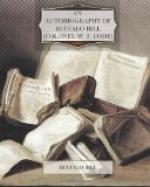She was in tears when she said good-by to her parents and friends, and still in tears after they had left. I tried to comfort her with assurances that when we came among Northern people I would not be regarded as such a desperate character, but my consolation was of little avail. At dinner the hostile stares that were bent on me from our neighbors at table did not serve to reassure her. It was some comfort to me afterward when the captain sent for me and told me that he knew me, that my Uncle Elijah was his old-time friend, and one of the most extensive shippers on the steamboat line. “It is shameful the way these people are treating you,” he said, “but let it pass, and when we get to Independence everything will be all right.”
But everything was not all right. In the evening, when I led my wife out on the floor of the cabin, where the passengers were dancing, every dancer immediately walked off the floor, the men scowling and the women with their noses in the air. All that night my wife wept while I walked the floor.
At daybreak, when we stopped for wood, I heard shots and shouting. Walking out on deck, I saw the freed negroes who composed the crew scrambling back on board. The steamboat was backing out in the stream. Later I learned that my fellow passengers had wired up the river that I was on board, and an armed party had ridden down to “get” me.
I quickly returned to the stateroom, and, diving into my trunk, took out and buckled on a brace of revolvers which had done excellent service in times past. This action promptly confirmed my wife’s suspicions. She was now certain that I was the bandit I had been accused of being. I had no time to reason with her now. Throwing my coat back, so that I rested my hands on the butts of my revolvers, I strolled out through the crowd.
One or two men who had been doing a great deal of loud talking a few minutes past backed away, as I walked past and looked them squarely in the eyes. Nothing more was said, and soon I reached the steward’s office, unmolested. Here I found a number of men dressed in blue uniforms. They told me they were discharged members of the Eighth Indiana Volunteers. They were traveling to Kansas, steerage, saving their money so they might have it to invest in homes when they reached their destination. They had all heard of me, and now proposed to arm and defend me should there be any further hostile demonstrations. I gladly welcomed their support, more for my wife’s sake than for my own.
“My wife,” I said, “firmly believes that I am an outlaw.”
“You can’t blame her,” said the spokesman of the party, “after what has happened. But wait till she gets among Union people and she will learn her mistake. We know your history, and of your recent services to General Sherman. We know that old ‘Pap’ Sherman wouldn’t have an outlaw in his service. If you had seen some of the interviews he has given out about your wife’s father and his friends there would have been trouble at the start.”




